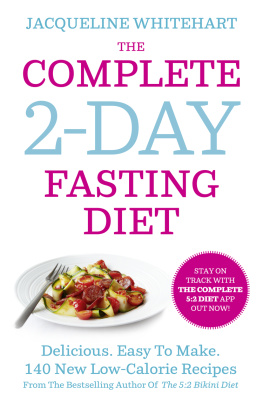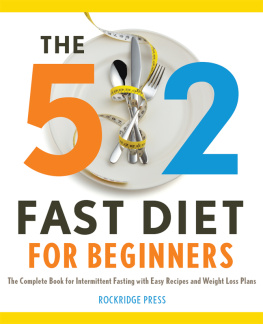INTRODUCTION L osing weight can be a struggle, especially if you feel like you are caught up in a cycle of following one fad diet after another. Many fad diets leave you feeling hungry or unsatisfied, and both feelings may decrease your likelihood of sticking to the diet. What if there was a way to maintain your current eating habits, making only slight changes to your diet, while still losing weight? This isnt some miracle drug or another fad dietit is the science of intermittent fasting. An intermittent fasting diet allows you to continue your normal eating habits five days a week, while following a reduced-calorie plan for two non-consecutive days each week. Studies have shown that this type of diet is much easier to follow in the long term than the typical calorie-restrictive diet. It has also been shown to be highly effective.
So if you are tired of watching the number on the scale go up and down, try something that truly works: an intermittent fasting diet. SECTION ONE An Introduction to Fasting for Health and Weight Loss INTRODUCTION TO INTERMITTENT FASTING F asting is simply the act of abstaining from all kinds of food, liquid, or both for a period of time. An absolute fast is generally considered a defined period of abstinence from all food and liquid, but other fasts may be less restrictive. In terms of physiology, the concept of fasting may be applied to an individuals metabolic state after the body has completely digested and absorbed a meal. It may also refer to the metabolic state of an individual who has not eaten anything overnight. What Is Intermittent Fasting? Intermittent fasting is a type of eating pattern in which individuals alternate between periods of non-fasting and periods of fasting. What Is Intermittent Fasting? Intermittent fasting is a type of eating pattern in which individuals alternate between periods of non-fasting and periods of fasting.
INTRODUCTION TO INTERMITTENT FASTING F asting is simply the act of abstaining from all kinds of food, liquid, or both for a period of time. An absolute fast is generally considered a defined period of abstinence from all food and liquid, but other fasts may be less restrictive. In terms of physiology, the concept of fasting may be applied to an individuals metabolic state after the body has completely digested and absorbed a meal. It may also refer to the metabolic state of an individual who has not eaten anything overnight. What Is Intermittent Fasting? Intermittent fasting is a type of eating pattern in which individuals alternate between periods of non-fasting and periods of fasting. What Is Intermittent Fasting? Intermittent fasting is a type of eating pattern in which individuals alternate between periods of non-fasting and periods of fasting.
The duration of fasting periods may vary as well as the type of fasting. Fasting days may involve completely abstaining from food and drink, or they might simply require a reduction in food intake. The number of fast days, and the frequency with which they occur, may also vary. An intermittent fasting diet may involve only a single fast day per month or it may involve fasting as often as every other day. How Is Intermittent Fasting Different from Full Fasting? The main difference between intermittent fasting and full fasting is that the guidelines for intermittent fasting are generally less rigid. Whereas a full, or absolute, fast requires abstinence from all food and drink, intermittent fasting can mean any number of things.
An intermittent fast could simply be an 8-hour period of the day during which you abstain from food or it could be one or two days a week during which you eat a reduced number of calories. The reasons for intermittent fasting versus full fasting may also vary greatly. Whereas full fasting is often done for religious purposes or as a way to detoxify the body, intermittent fasting is largely associated with weight loss. What Are the Benefits of Intermittent Fasting? Though there is some debate regarding how to employ intermittent fasting for weight loss, the practice of intermittent fasting has been shown to provide a number of significant benefits. Short-term calorie restriction or abstinence from food may be beneficial in: Encouraging weight loss. During fasting periods, your body will be more likely to use fat for energy.
As your body burns fat, ideally, you will lose weight. Improving cardiovascular function. Intermittent fasting has been shown to improve cardiovascular function by reducing blood pressure and offering protection against ischemic heart damage. Decreasing risk for disease. In 2007, the University of California, Berkeley, published a summary of the effects of alternate-day fasting in animals and humans. Authors Krista A. Varady and Marc K.
Hellerstein concluded that alternate-day fasting may help reduce the risk for cardiovascular disease, cancer, and diabetes (Varady, et al., 2007). Improving medical treatments. When paired with chemotherapy treatments and blood sugar control measures, periods of intermittent fasting have been shown to improve the effectiveness of treatments. Increased fat burning. During fasting periods, the body experiences an increase in fatty-acid oxidation, especially during the latter part of the fast. Regulating the metabolism. Many nutritionists offer the advice to eat many small meals throughout the day, which may contribute to problems with overeating.
Intermittent fasting may help keep your metabolism strong and healthy. Protecting against neurodegenerative disease. The same summary published by the University of California, Berkeley, also concluded that alternate-day fasting may help protect the body against some of the effects of neurodegenerative diseases like Parkinsons and Alzheimers (Varady, et al., 2007). Increasing other health factors. Periods of intermittent fasting may also help reduce inflammation, lower blood pressure, and reduce oxidative stress. Cautions and Caveats Though the benefits of intermittent fasting may be compelling, this practice is not recommended for everyone. Cautions and Caveats Though the benefits of intermittent fasting may be compelling, this practice is not recommended for everyone.
Before you make any drastic changes to your diet or lifestyle, it is wise to learn both the associated advantages and disadvantages. Unfortunately, much of the research that has been done regarding intermittent fasting has been performed using animals. Animals such as rats and chimpanzees may respond positively to periods of intermittent fasting, but they cannot be considered ideal models for predicting the response of the human body. There is limited scientific data available regarding intermittent fasting in human subjects, and individuals may respond to intermittent fasting in different ways depending on their health and other factors. Also, even though an intermittent fasting diet can be beneficial, it can also be dangerous if you do not structure your diet appropriately. It is important that, on non-fast days, you provide your body with wholesome, nutrient-rich foods rather than seeing a non-fast day as an excuse to indulge in junk food.
It is also important to note that intermittent fasting is not recommended for anyone under the age of eighteen or for women who are pregnant or lactating. Individuals with certain diseases, including diabetes, gastrointestinal reflux disease, and gastroesophageal reflux disease, may not respond well to intermittent fasting, because these conditions are difficult to manage without the regular intake of food. Intermittent fasting is also not recommended for people with a history of eating disorders. Even if none of the preceding conditions applies to you, discuss fasting with your physician prior to attempting it on your own. Exercise Guidelines While Fasting It is important to be cautious when exercising during a fast because if the fast limits your intake of water or nutrients, extensive exercise could be harmful to your body. Studies have shown, however, that exercising in a fasted state may not only encourage weight loss, but fat loss as well.
Exercising in a fed state, on the other hand, has shown to produce only general weight-loss results. This does not mean that you should engage in extended exercise during every fast, but incorporating moderate exercise into your fasting schedule can be beneficial. During your workout, do not try to push yourself beyond your limitsif you begin to feel dizzy or faint, stop immediately. After your workout, it is important to refuel your body with a recovery meal. Ideally, this meal should include some kind of protein such as whey protein, which is quickly absorbed by the body. 




















 INTRODUCTION TO INTERMITTENT FASTING F asting is simply the act of abstaining from all kinds of food, liquid, or both for a period of time. An absolute fast is generally considered a defined period of abstinence from all food and liquid, but other fasts may be less restrictive. In terms of physiology, the concept of fasting may be applied to an individuals metabolic state after the body has completely digested and absorbed a meal. It may also refer to the metabolic state of an individual who has not eaten anything overnight. What Is Intermittent Fasting? Intermittent fasting is a type of eating pattern in which individuals alternate between periods of non-fasting and periods of fasting. What Is Intermittent Fasting? Intermittent fasting is a type of eating pattern in which individuals alternate between periods of non-fasting and periods of fasting.
INTRODUCTION TO INTERMITTENT FASTING F asting is simply the act of abstaining from all kinds of food, liquid, or both for a period of time. An absolute fast is generally considered a defined period of abstinence from all food and liquid, but other fasts may be less restrictive. In terms of physiology, the concept of fasting may be applied to an individuals metabolic state after the body has completely digested and absorbed a meal. It may also refer to the metabolic state of an individual who has not eaten anything overnight. What Is Intermittent Fasting? Intermittent fasting is a type of eating pattern in which individuals alternate between periods of non-fasting and periods of fasting. What Is Intermittent Fasting? Intermittent fasting is a type of eating pattern in which individuals alternate between periods of non-fasting and periods of fasting.